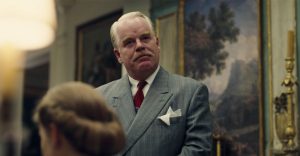It’s often very difficult to know how to react when a famous person dies, particularly when they die young. There’s shock and sadness for sure, but the familiarity is so detached you feel somewhat distanced from it. They might have given you hours of entertainment, you might have had tremendous respect for them, but at the end of the day you didn’t really know them, only a shade of them. I think that hearing about Philip Seymour Hoffman’s untimely death was the first time I have found a celebrity’s death legitimately, deeply upsetting right from the outset. It hit me hard because I knew what had been lost, and everyone I’ve spoken to about it agrees that we’ve lost one of the great masters of stage and screen acting. A man who had so much more to give.
In many ways Hollywood is still as shallow as it’s ever been; if you’re not poster-material and you don’t often go in for comedic roles, getting any spotlight attention won’t be easy. PSH is one of those actors who dominated the stage while building up a roster of strong supporting roles in cinema; roles that he approached with admirable versatility, but limited roles nevertheless. When you really start to think about it, it’s impressive how much he could do with such minor screen time. Characters like the marvellously neurotic Brandt (The Big Lewbowski), the shady, conceited Freddy Miles (The Talented Mr. Ripley) and the disillusioned and misanthropic music journalist Lester Bangs (Almost Famous) probably couldn’t rack up an hour of screen time combined, but they easily succeed in being some of the most memorable, interesting characters in their respective films.
Perhaps the director who best understood PSH’s prowess, his ability to commit to roles and bring them to life, was Paul Thomas Anderson. Their first collaboration came with Hard Eight, an excellent and often overlooked noir in which Hoffman appears in only one scene as a bloated, mouthy dice player who hurls his misappropriated ego in every possible direction. He’s in and out in 3 minutes, but you don’t forget him. Next he appeared in the epic depravity play Boogie Nights as a lonely, self-hating sound recordist whose desperate pass at porn superstar Dirk Diggler (Mark Walberg) is surely one of the film’s most renowned moments (not to mention the heart-wrenching aftermath). Phil Parma, his solitary nurse in Magnolia is surely the moral heart of a film that painted a deeply unpleasant world, but the absolute highlight of the PTA/PSH list is by far the most recent offering: The Master. An utter triumph of a film (the best thing that came out in all of 2012 for my money), Hoffman plays Lancaster Dodd, the leader of a strange religious cult operating out of 50s California, and he doesn’t miss a beat. Despite being secondary to Joaquin Phoenix’s tortured protagonist, Dodd is by far the most memorable character in the film. He steals every scene he appears in, from his angry outburst at a skeptical nay-sayer (‘pig fuck!’) to an appropriately camp rendition of ‘Go No More A-Roving’. He depicts a perfectly toned accent which falls somewhere between 50’s west coast and British RP and moves with a kind of uneasy swagger that barely conceals the rage burning beneath.
Whenever PSH was afforded a role that size he showed us what he was really capable of. He did land two starring roles later into his career, and in both instances he left us with legendary performances. He plays a twisted, jealous Truman Capote in the role that won him his academic recognition (which he accepted with admirable grace) and was the absolute perfect casting choice for Charlie Kaufman’s surreal directorial debut: Synecdoche, New York. Kaufman’s scripts always blurred the lines between reality and fantasy, as any fan of Adaptation or Being John Malkovich will attest, but this film took it to another level. It’s long, disjointed and challenging but if you bear with it you’re left with a powerful, emotional statement of a film and a lot of that is down to Hoffman. He plays a struggling playwright through a devastating cycle of failure, rejection and broken ties. If you want to get the most complete sense of Hoffman’s acting ability that any one film has to offer, watch Synecdoche, New York. At 46 years old, Hoffman seemed like he was only really getting started, and now a storming career of 58 film roles, numerous directing and art directing stage credits and stage roles that included Iago and Willy Loman has been tragically cut short. He leaves his long time girlfriend and three children and you’ll be able to see him on screen in the cinema in one last role when The Hunger Games: Mockingjay comes out. Beyond that I urge you to seek out any of the films mentioned in this article that you might not have seen, any of his roles period – he never approached a single one with anything less than his all. He commanded the stage and screen with a depth and emotional honesty that’s extremely rare and he’ll be sorely missed.
Some of the coverage you find on Cultured Vultures contains affiliate links, which provide us with small commissions based on purchases made from visiting our site.


